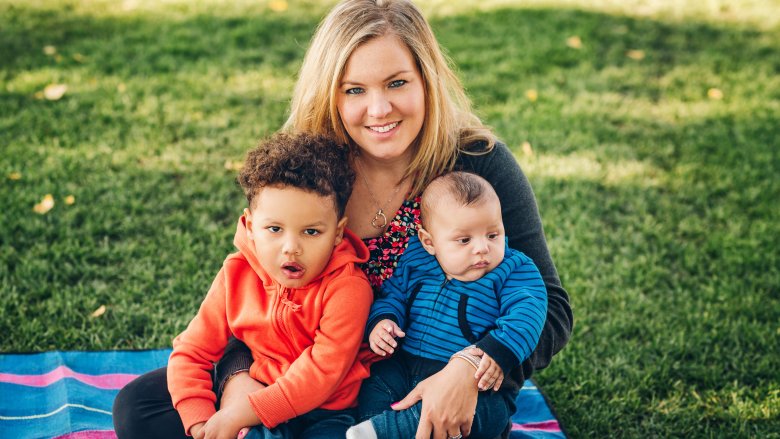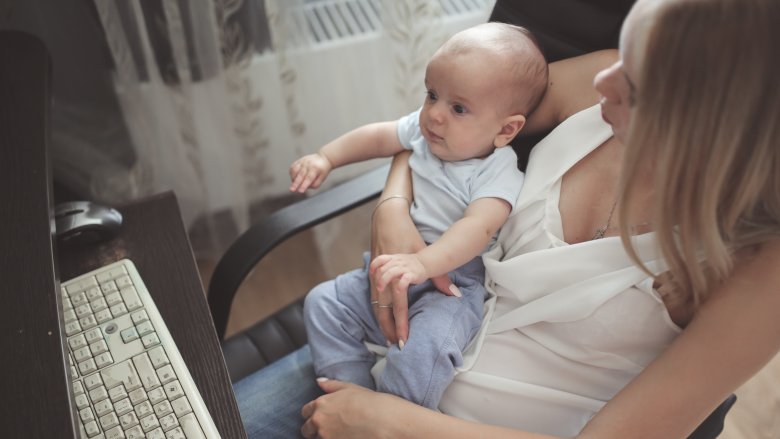Things That People Without Kids Don't Understand
When you become a parent, you join an exclusive group of people who just "get it." Parenting is one of the hardest jobs on the planet. You're always on call, everything constantly changes, and no matter how hard you try to be a "perfect parent," your kids do things you never anticipated or planned for. It's enough to make your head spin. On the other hand, the love you have for your kids makes it all worth it. Here are a few of the things you need to have kids to fully understand.
You can't learn how to parent from books
As a diligent parent, you probably read a ton of books to try to "get ready" for the huge change you're about to experience. But unfortunately, you can't learn how to parent from books. Fern Weis, parent-teen relationship coach told me, "We all have ideas about what should work, mostly drawing from our own experience. But when you get past the care and feeding of an infant, there's very little that's predictable."
She added, "That little person in front of you has her own personality, wants, and needs. No matter what you read in books or hear from friends, there is nothing one-size-fits-all about parenting. You feel like you're making it up as you go."
No matter how well-intentioned your friends are and no matter how well-researched that parenting book is, your child is unique, with their own unique challenges and strengths. As much as you might want to have it all figured out, your kid will often throw you for a loop.
You're not a bad parent because your kid messes up
Kids make mistakes. They mess up and do things you don't want them to do, but that doesn't mean you're a bad parent. Weis told me in our interview, "It's very easy for people to critique your exhaustion, worry, and lack of consistency. The reality is that everything changes when you have children. It's the most important, awesome, unpredictable, nerve-wracking, and rewarding job you'll ever have — raising this child, teaching him your values, and preparing him for life on his own. The stakes are high."
She continued, "When this child veers off the path you envision for him (from missing homework to drugs, and everything in between), every button you have is pushed. As they go into the teen years, the truth is that you really are not in control and there are no guarantees. Your job is to see how you can influence your child and where you have leverage."
Unfortunately, it's all too easy for people to judge parents without understanding the full picture. Weis added, "It's tough enough that parents are hard on themselves. Add to that the people who are not in the trenches and see your children and their actions as a reflection on you."
Sometimes your parental instincts override logic
While raising a child is often a struggle, the love that comes with having kids is one of a kind. Aricia Shaffer, former therapist and parenting coach, told me, "That love, fortunately, informs every single decision you make and can impact other relationships. The parent-instinct often overrides logic and that can be a good thing. Sometimes our instincts keep our kids safe. But it may not make sense to non-parents."
She shared, "One of my clients had been doing some career coaching with me. It culminated in a job offer which sounded ideal, but he would need to move out of state with his two little girls. While everything was falling into place, something was nagging at him and telling him not to move."
Despite how great this job was, Shaffer said, "He wound up passing on the job. About a year later, his little girl was diagnosed with an illness and the best treatment options were not even available where they would have moved. His instincts were right on."
Shaffer shared advice for non-parents. "You may not know why your friend is doing what they're doing if you don't have children, but they likely have good reason," she said. "The answer may seem obvious to you, but emotion and intuition can't be removed from the equation."
You're exhausted, but it's worth it
Raising kids is extremely tiring, but because of your love for your kids, it's worth it. Shaffer told me, "With nearly every other career choice, you have down time. There may be times that are busier than others, but if you absolutely have to, you can sleep, eat or even quit." However, she added, "Parenting is the one job that regardless of what is needed, you must rise to the challenge. It can be a time of spectacular growth, but it can also be a trial by fire. Being awake with a sick child for 72 hours straight with little chance to even run to the bathroom or grab a bite is demanding."
But you wouldn't give up this tough job for anything. Shaffer continued, "Perhaps even more confounding to non-parents is that you wouldn't have it any other way. There is nothing more gratifying to parents than to get their child through a difficult time."
No matter how much your exhaustion is worth it, it does take a toll. Shaffer said, "I have had clients come in who tell me they find their keys in the freezer and the milk in the cupboard! There are times when you're parenting when you can hardly see straight and at those times, it's vital to have some support."
You're constantly on call
Your non-parent friends may not understand why you aren't available, but when you're a parent, you may feel like you have to be on call for your kids much of the time. Shaffer told me, "As kids get older, parents are often 'on call.' You're waiting for the next time you're needed. It can become habit so even after the kids are old enough to rarely need help, parents can find themselves without much of a life — just waiting for the kids to need them."
Shaffer added, "Parents, particularly stay at home parents, need to reinvent themselves as their kids get older. Old careers, hobbies, and friends may no longer be a fit. This time can feel like a crisis with a lot of regrets."
If you're friends with a parent who is going through this transition, Shaffer suggested, "As a friend, it's good to know about this time — usually hitting when your friends are in their 40s and 50s, because you can be a huge source of support. Parenting can be a very absorbing career and can last for decades. It's a huge investment and the pay-offs aren't always obvious. Helping friends see the differences they have made in their family or their community is a gift."
There are limits to what you can control
If you're a control freak, parenting helps you let go a little — whether you want to or not! Jill Whitney, a licensed marriage and family therapist, told me, "No parent can force any child to eat something or go to sleep. You can do lots of things to encourage healthy eating; you can structure a bedtime routine that makes it more likely your child will get to bed at a reasonable hour. But when kids dig in their heels — as all of them do sometimes — you can't make them."
Even if you try to make them do what you want, Whitney said they'll find a way around it. "You can refuse to give them the junk food, but you can't make them eat their peas. You can insist that they stay in their bed quietly, but they won't fall asleep until they're ready."
Whitney added that this lack of control will force you to have some humility. She said, "Parenting is so humbling. You're so much smarter and stronger than your child, but there's only so much you can control. Wise parents learn to work with their kids' style rather than fighting against it. You make the rules, but how they get implemented is sometimes a negotiation. And sometimes things just don't go the way you want."
Tantrums happen even to good parents
Has your kid ever thrown a tantrum in public? It doesn't necessarily mean you're doing something wrong. Whitney told me that tantrums aren't always a bad sign. She said, "Pitching a fit in the grocery store is a normal part of testing limits. Kids are trying to learn about the world and how much they can control. They learn that crying often gets our attention... so maybe crying louder would work even better? If I yell loud enough and embarrass Mommy enough, can I have the candy bar?"
If you're judging a parent for their child's tantrum, she advised, "The test of whether that frazzled, embarrassed parent is doing a good job isn't whether the kid has a tantrum — it's how she handles it. If tantrums result in rewards, they keep happening. On the other hand, if a tantrum backfires for the kid, he'll quickly learn tantrums aren't effective techniques."
For parents, she suggested, "You can validate the feelings, but don't cave. Tell your kid, 'I know you're disappointed I won't buy you the candy, but now that you've had a tantrum, there is no way I'm going to buy it. If you ask nicely, sometimes I may say yes; but if you yell, the answer will always be no.'"
Parents get very busy
Being a parent is all-consuming, and sometimes it means you can't do the things you used to, like going to parties or getting together with friends. That may be difficult for people without kids to understand.
"One thing people without children don't tend to understand is how busy parents are. Not only are you taking care of other human beings' every needs in addition to your own, but you have their schooling, social lives, and activities to tend to," Licensed Psychologist Jesse D. Matthews explained." This all takes up a lot of time, which leaves little time or energy to do thing things you did before kids — like meeting up for dinner or drinks, going away for guys' or girls' weekends, and attending impromptu get-togethers."
He's also experienced this in his own life as a parent. "Some family members who didn't have children when my wife and I did used to get mad at us every time we couldn't attend a party, when we would come but would have to leave early, or when we would bring our kids over and they would mess around with their knick knacks and furniture." Matthews continued, "It was so frustrating for us because we were already struggling! But after a few years, our kids are older and easier (in some ways), and we watch them struggle with their young children. I think they get it now."
Being a parent takes a lot of self-sacrifice
When you don't have kids, you can put yourself first, but when you have kids, your needs often get put on the back burner. Matthews told me, "A second thing people without children don't get is that most parents learn to put their children first, sacrificing many of their own needs or changing their standards for things like self-care, how much time they need with friends, and how much time they may spend working."
He shared, "Since I've had children, I did without a lot of things I used to prioritize — new clothes and shoes whenever I wanted them; I drove a dorkier, older car; and I would get my hair cut every four to five weeks, instead of every two. When you're single or don't have children, rarely do you have to put others first, so I think this is a really tough concept for people to relate to until they get there."
You have to be incredibly flexible with your schedule
Because you're so busy and your kids take priority, you need to be very flexible, something your friends without kids may not fully "get." Matthews shared with me, "Another thing people without children struggle to understand is that being a parent requires you to be flexible in ways that people without children don't. For example, a parent might have to take a sick day or work from home to stay home with a sick child."
When you have kids, work/life balance becomes a much greater struggle as well. Matthews added, "Life balance becomes more of an issue, given a greater variety of things to balance. Given increased responsibilities related to parenting, a parent might end up working late at night, early in the morning, or during the weekend — whereas a non-parent might do a better job of keeping work at work, given their ability to come in early, stay late, or due to less need to miss work days."
This can cause tension at work, where people without kids won't understand why you're so frazzled. Matthews said, "Coworkers and supervisors or bosses may not understand what parents deal with, which can create stress for the parent/employee, as well as perhaps tension in the workplace. Colleagues may also not understand that their parent counterparts can't attend every happy hour or co-worker get-together either."











